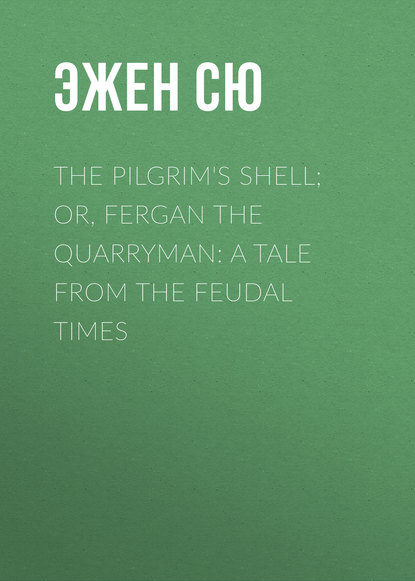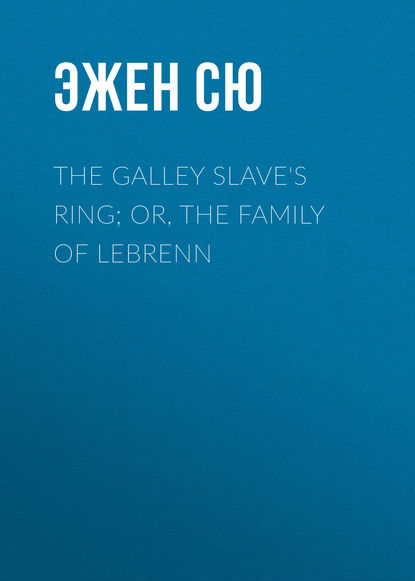
Полная версия
The Pilgrim's Shell; Or, Fergan the Quarryman: A Tale from the Feudal Times
"Leave the country, you stupid and savage wolf!"
"Whither shall I go and be happier? Here I am master. What would my fate be elsewhere? During my absence, my neighbors would descend upon my domains like a flock of vultures. The devil! I am bound to my seigniory like my serfs to the glebe!"
"Your fate is that of all the nobles, your peers."
"But they are not weighed down by their existence like I. Only a few years ago, during the life of my wife Hermengarde, I attacked my neighbors as much for the pleasure of it as to appropriate their lands and to sack their castles. I went on the hunt for caravans of merchants with joy and spirit. I put the prisoners to the torture and delighted at their grimaces. In short, I felt that I lived; I was happy; I ate and drank enormously, and then fell asleep in the arms of one of my female serfs. The next morning I attended mass and departed for the chase, to battle or on a pillaging expedition; that is, on a new round of pleasures." After a moment's silence the seigneur of Plouernel added, with a sigh: "Those days I was a good Catholic! I practiced the faith of my fathers, and every morning, after mass, the chaplain gave me absolution for the deeds of the previous day! To-day, thanks to your wicked contrivances, all my beliefs are overthrown. I have become a pagan! – Aye, a pagan!"
"You, poor imbecile, who carry under your hauberk four relics blessed by the Pope!"
"Will you dare to mock me for my faith in relics?" bellowed Neroweg in a towering rage. "Without the relics that I carry about me you might by this time have dragged me to the bottom of hell, you worthy wife of Satan!"
"Maychance you speak truth, seigneur Count!"
"There is nothing human about you! Your lips are cold as marble; your kisses are frozen!"
"When a reciprocal love shall inflame my veins, then my lips will grow purple, and my kisses will be of fire!"
"Oh, I know it; you never loved me!"
"As well love a wolf of the forest as a Neroweg. You carried me off by force, and I have had to submit to your lust. The man whom I adore, whom I have long loved, even without seeing him, is William the Ninth, the handsome Duke of Aquitaine."
"William!" exclaimed Neroweg in an accent of ferocious jealousy. "That sacrilegious wretch, who carries on his shield the portrait of Malborgiane, his mistress!"
"William is a poet; he is young, handsome, bold, bright and gay. All women dream of, and all men dread him. You are his vassal. Woe unto you should you dare cross him! He would leave not one stone on the other in your castle. He would make you grovel on the ground on hands and knees; he would clap a saddle on you and ride on your back a hundred steps at a stretch, agreeable to the right of a sovereign over his revolted vassal. You are as far removed from the handsome Duke of Aquitaine as the dull buzzard is from the noble falcon that darts towards the sun making its golden bells tinkle!"
Neroweg uttered a cry of rage, and, drawing his dagger, rushed upon Azenor. But her marble figure remained impassive, her white lips curled in disdainful smile. "Kill me, coward knight, assassin!"
After a moment of savage irresolution, Neroweg returned his dagger to the scabbard: "Oh, damned be the day I captured you on the road to Angers. It is you who brought down the curse that rests upon this castle. But will ye, nill ye, you shall yourself break the spell you have thrown upon me and my children, who, like their father, are becoming somber and silent."
"That's the business of the philter, which I am preparing."
The conversation was at this point interrupted by two raps on the door from without. Neroweg asked roughly: "Who's that?"
"Seigneur Count," a voice answered, "you are waited to open the session of the court in the stone hall!"
Neroweg made a gesture of impatience, and, donning the iron casque which he had laid on a settee, replied: "Once the homage of my vassals pleased my vanity. To-day everything annoys, everything is irksome to me. Oh, sad is my life!"
"To-morrow, thanks to my philter, nothing more will weigh upon you – nor upon yours," observed Azenor, and, placing in the Count's hands the two little wax images, she added: "Your two enemies – the Sire of Castel-Redon and the Bishop of Nantes – will soon fall into your hands, provided you yourself place these magic figures where I have told you, while you pronounce three times the names of Judas, of Astaroth and of Jesus."
"It is hard for me to pronounce the name of Jesus in connection with this sorcery," remarked Neroweg, raising his head and receiving almost fearfully the two little figures. "To-night the philter; if not, you die to-morrow!" Then, bethinking himself, "Where is the child?"
"In that alcove," answered Azenor.
Neroweg walked towards the turret, raised the curtain and saw little Colombaik, the son of Fergan the Quarryman, lying on the floor. The innocent creature was sound asleep at the foot of a stand loaded with vases of bizarre form. The walls of the turret, paneled with marble slabs, rose bare to the ceiling, the floor of whose upper story was on a level with the platform of the donjon. Neroweg, after contemplating the child for an instant, stepped out of the donjon, double-locking the door after him, and taking care to withdraw the key and place it in his jerkin.
CHAPTER VI.
FEUDAL JUSTICE
Eberhard the Tricky, one of the equerries of the seigneur of Plouernel, awaited his master outside of the retreat of Azenor, in company with Thiebold, justiciary provost of the seigniory. The latter addressed Neroweg, who was slowly descending the stone staircase.
"The chatelain of the fort of Ferte-Mehan signed the relinquishment of his fief of Haut-Menil at the third wedge struck into his knee by the gaoler. The Sire of Breuil-le-Haudoin died of the results of the torture. The Abbot Guilbert offers three hundred silver sous for his ransom. But he has not yet been put to the torture, and such offers mean nothing. We shall proceed in order."
"And then? What other cases are there?"
"That's all. There is to-day nothing else on hand."
While carrying on this conversation the Seigneur of Plouernel, his provost and his equerry, descended to the basement of the donjon-keep, at the corner where the staircase landed. A narrow window, guarded with enormous iron bars, alone lighted this vast hall, bare, somber and vaulted. In the inside yard several men-at-arms held themselves ready to mount their horses. Near the center of the hall, which served as a court of pleas, stood, according to custom, a large stone table, behind which ranged themselves the officers of the house of the Count – the master of the horse, the master of the chamber, the master of the dogs, of the falcons, of the table, and several other dignitaries. These people, instead of being paid by the seigneurs, bought from them these hereditary offices in their families, an inheritance that at times became odd by the contrast it presented between the function and the incumbent. It happened that a post of runner, sold in fief to an agile and vigorous man, often descended as the inheritance of a son, as unfit for the post as a broken-winded ox. The seigneurs, with an eye to revenue, multiplied these offices all they could, and the purchasers yielded, not so much to the pride of belonging to the seigniorial households as to the desire of sheltering themselves from the master's lawlessness, and of sharing the fruits of his brigandage. In those dark days, the choice was between oppressing or being oppressed; submitting to the horrors of serfdom, or becoming the instruments of the feudal tyrants; joining them in doing violence, robbing and torturing one's fellows, or resigning oneself to undergo all these sufferings himself. Such were the sad results of the Frankish conquest. The seigneurs imposed servitude, the friars preached resignation, and the people of Gaul became cowardly, selfish and cruel. They rent themselves with their own hands by turning accomplices to their gaoler.
Besides the head domestics of Neroweg, present at these law courts, – which took the place of the Germanic "malhs" of the reign of Clovis – there was also the provost, the bailiff and the scribe of the seigniory. The latter, seated on a stool, his parchment rolls on his knees, his desk beside him, his pen between his teeth, awaited the opening of the session. The first domestics of the Count, respectful and timid, remained standing in a semi-circle behind their master. Since four of five centuries back, the class of the leudes, who, in the early days of the Frankish conquest, lived in common with and as equals of their chiefs, had ceased to exist. In the measure that the conquest became more firmly fixed, the titulary and beneficiary seigneurs of the soil of Gaul, shocked at the idea of equality contracted by their old companions in arms, evicted them little by little from the domains where chiefs and leudes had lived in common. The descendants of these obscure Frankish warriors, sacrificed to the pride and cupidity of the beneficiaries, soon fell into misery, and from misery into a servitude equal to that of the Gauls. Since then, Franks and Gauls – the former disinherited by ingratitude, the latter by conquest, and now joined in misery and servitude – felt a common hatred towards the church and the seigneurs. There were then but two classes – the common people, serfs, peasants and bourgeois or townsmen; and nobles, knights and seigneurs. The latter, isolating themselves ever more, lived like absolute sovereigns in their strongholds, having no equals, but only menials, the accomplices of their acts of brigandage; or serfs, stupefied by terror or besotted by the friars.
Gonthram and Guy, the two sons of Neroweg, the younger at the left, the elder at the right of their father, attended the court. The latter had just reached the age of knighthood, a glorious event, so dearly paid for by the serfs of the seigniory. Gonthram resembled his father greatly. A look at the whelp told what he would be when age would have made of him a wolf. Guy, the younger, seventeen years of age, recalled the sardonic and vindictive features of his mother, Hermangarde. These two youths, brought up in the midst of this life of strife, of rapine and of debauchery, left to the violence of their passions, disposing as masters over an abject population, had none of the charms that are the attribute of adolescence. Away in a corner of the hall stood several bourgeois of the little town of Plouernel, who had come to complain of the exactions of the Count's men; or to excuse themselves for failure to pay the imposts in money and goods that it had pleased their seigneur to lay upon them; or to plead that the dues credited to the seigneur had long been met or exceeded; or yet to announce that they had removed from their roofs the weather-vanes, placed there in ignorance of the seigniorial rights, and taken down the pigeon houses they had started to raise in violation of the prescriptions of the feudal law.
The court was also attended by noble vassals of Neroweg, owners of smaller fortified places or of manors, held under the Count of Plouernel, the suzerain of these fiefs, the same as Neroweg, a vassal of William IX., Duke of Aquitaine, held under that suzerain, who, as vassal of Philip I., in turn held of that French King, the supreme sovereign. This hierarchy of all feudal seigniories existed in name only, never in fact. The great vassals, veritable sovereigns, entrenched in their duchies, laughed at the impotent authority of the King. In turn, the sovereignty of the dukes was almost despised, contested or attacked by their vassals, who were absolute masters in their seigniories, as the dukes in their duchies. The immediate vassalage, however, such as rested on the vassals of the seigniory of Plouernel, was ever enforced in all its fullness and tyrannic severity. There, at any time, the implacable vengeance of the suzerain could reach directly the goods and chattels of the recalcitrant vassal. Among the people who had come from the city, from the fortified cities or from their manors, was a handsome young girl, accompanied by her mother. Sad and uneasy, the two exchanged alarmed looks when the seigneur of Plouernel, entering the law court with a somber mien, sat down on a throne, one son at his right, the other at his left, and ordered Garin the Serf-eater to call the roll of cases entered for the session.
The bailiff bore no further mark of the wound he had received from Pierrine the Goat than a plaster on his forehead. He took up a scroll and commenced calling up the list of cases:
"Gerhard, son of Hugh, who died last month, succeeds his father in the fief of Heute-Mont, held under the Count of Plouernel. He comes to acquit the right of relief, and to pledge fealty and homage to his suzerain."
Thereupon, a man still young, covered with a leather casque and carrying at his side a long sword, stepped forth from the group of persons who had come to the session of the court. He came forward holding in his hand a large purse filled with money, and placed it on the stone table, thus acquitting the right of relief due the seigneur by all vassals who take possession of their inheritance. Then, upon a sign of the bailiff, the new castellan of Heute-Mont, taking off his casque and unbuckling the belt of his sword, placed himself humbly on both knees before the seigneur of Plouernel. The bailiff, however, noticing that the country squire, having come on horseback, retained his spurs, addressed him in an angry tone: "Vassal, dare you take the pledge of fealty and homage to your seigneur with the spurs at your heels?"
The young castellan repaired the incongruity by removing his spurs and dropping back upon his knees at the feet of Neroweg, with hands joined and head lowered, he humbly waited for his seigneur to pronounce the consecrated formula: "You acknowledge yourself my liege as the holder of a fief in my seigniory?"
"Yes, my seigneur."
"You swear upon your soul never to carry arms against me, and to serve and defend me against my enemies?"
"I swear it, my seigneur."
"Keep thy oath. At the first felonious infraction thy fief reverts to me!"
Gerhard rose, replaced his spurs and buckled on the belt of his sword, while casting a sad look upon the purse of money with which he had paid his right of relief.
After the lord of Heute-Mont, a richly dressed young girl stepped forward, uneasy, trembling and her eyes full of tears. Her mother, not less moved than herself, accompanied her. When both were a few steps from the stone table, the seigneur of Plouernel said to the damsel: "Have you decided to obey the orders of your suzerain?"
"Monseigneur," answered the young girl, in a feeble and suppliant voice, "it is impossible for me to resign myself to – "
She could not finish. Sobs smothered her words, and, breaking out in tears, she dropped her head upon the shoulder of her mother, who said to the Count: "My good seigneur, my daughter loves Eucher, one of your own vassals. Eucher loves my daughter Yolande no less tenderly. The union of these two children would make the happiness of my life – "
"No! no!" interrupted the seigneur of Plouernel, in a towering rage. "By the death of her father Yolande holds a fief under my seigniory. Mine alone is the right to dispose of her in marriage. She must choose a husband from among the three men whom, according to our usage, I have designated. They are three Franks, that is, nobles – Richard, Enquerrand and Conrad. The eldest of them not being yet sixty years old, the age limit is observed. Does Yolande accept one of my three lieges for her husband?"
"Oh, seigneur," replied the mother imploringly, while the young girl sobbed aloud, "Richard is mean looking and blind of one eye; Conrad is a murderer; he killed his first wife in a fit of passion; Enquerrand is lame, wicked and feared by all who come near him, moreover, he is too old for my daughter, he will be sixty years within two months. None of them is fit for Yolande."
"Your daughter, accordingly, refuses to wed one of the three men presented by me?"
"Seigneur, she wishes no other husband than Eucher; and I may assure you the lad is worthy of the love of my daughter."
"The devil! We have had words enough. If your daughter insists upon refusing to select from among my men, and marries Eucher, the fief reverts to me. It is my right. I shall enforce it."
"In the name of heaven, monseigneur, if you appropriate our lands what shall we live on? Are we to beg our bread? Have pity upon us!"
Yolande raised her beautiful face, pale and wet with tears, took a step towards Neroweg, and said, with dignity: "Keep the heritage of my father. I prefer to live in poverty with him whom I love than to wed any of these men of yours who inspire me with horror."
"My daughter!" exclaimed the distracted mother, "disobedience to the seigneur of Plouernel means misery for us!"
"Marriage with one of the three men proposed, means death to me," answered the poor child.
"Seigneur, good seigneur!" resumed the stricken mother, "deign to allow Yolande to remain a spinster. You would not force her to the choice between our ruin and a marriage that horrifies her?"
"No fief can remain in the possession of a woman," was the sententious utterance of the bailiff. "Usage is opposed to it."
"We have had enough of words!" cried out Neroweg, stamping the ground with rage. "This young woman refuses to wed one of my men. The fief is now mine. Bailiff, you will this evening send a force to take possession of the house and all its contents. You will eject the two women."
"Mother, let's depart," said Yolande, proudly. "We once were free and happy; now we are no better than serfs. But I prefer their sad lot to that reserved for me by Count Neroweg in delivering me to one of his bandits."
Undoubtedly the seigneur of Plouernel would have revenged himself for the bitter reproaches of Yolande had he not been prevented by the sudden arrival of one of his men, who, running in all out of breath, brought news of the arrest of the Bishop of Nantes, who had appeared at the toll gate disguised as a mendicant friar, and was recognized by one of the guards.
"The Bishop of Nantes in my power!" exclaimed Neroweg. "Azenor predicted it. Her magic charm begins to operate!" He rose precipitately from his throne, and, followed by his sons and several of his equerries, ran to meet the bishop, his enemy, who was being led a prisoner, together with the other travelers captured by the armed guards posted at the toll gate. Bezenecq the Rich and his daughter Isoline accompanied Simon, the Bishop of Nantes, and the monk Jeronimo, clad like a prelate. After his vain efforts to induce the travelers not to cross the seigniory of Plouernel, the bishop had, nevertheless, joined them, not venturing to enter alone with Jeronimo upon the territory of the seigneur of Castel-Redon, and hoping he would pass unperceived amidst a numerous troop. Unhappily for him, among the guards at the gate was a soldier named Robin the Nantesian, who had lived in the city of Nantes, and where he had opportunity to see the leading personages among the inhabitants. He quickly pointed out Bezenecq the Rich as a townsman from whom it would be easy to extract a big ransom. Noticing, thereupon, a monk, who seemed anxious to keep his cowl over his head, he pulled the frock off the monk and recognized the Bishop of Nantes, a personal enemy of the Count. The men of Neroweg then seized the two friars, pinioned them, as well as Bezenecq and his daughter, and accepted the toll from the other passengers, whom they allowed to pursue their journey. The bourgeois of Nantes, bound upon his mule, with his daughter bathed in tears at the crupper, was carried to the castle, with the bishop and Jeronimo, their hands tied behind their backs, following on foot. When the captives arrived at the first court-yard of the castle, Bezenecq alighted from the saddle, and, freed from his bandages, he held up his daughter, ready to faint. The bishop, pale as death, leaned upon the arm of Jeronimo, whose resolute carriage betrayed no fears. Neroweg, accompanied by his sons, arrested his hurrying steps when he came close to the prisoners, and, addressing them, said, sardonically: "I greet you, Simon! I greet you, holy man, my father in Christ! I hardly looked for this joyful meeting!"
"I am at your mercy," answered the prelate; "the will of God be done. Do with me as you will."
"I shall avail myself of your leave," replied the seigneur of Plouernel. "Oh, this is a happy day to me!"
"I ask only one favor," rejoined the bishop, "the favor of keeping near me this poor monk until the moment of my death, that he may help me to die like a Christian."
"I do not mean to send you quite so soon to Paradise. I have other designs upon you," and beckoning to Garin the Serf-eater to draw near, the seigneur of Plouernel whispered a few words in his ear. The bailiff nodded affirmatively, crossed the drawbridge and entered the donjon.
During their father's brief dialogue with the bishop, Guy and Gonthram had not ceased to pursue Isoline with their lascivious looks, and the frightened young girl had hidden her face on the breast of her father. Robin the Nantesian, raising his voice, said to Neroweg, while placing his hand on the shoulder of the townsman: "This is one of the richest merchants of the city of Nantes. He is called Bezenecq the Rich. Forget not that he is worth his weight in gold."
The Count fastened his falcon eyes upon the captive, and, taking two steps toward him, said: "Your name is Bezenecq the Rich?"
"I am so called, noble seigneur," humbly answered the bourgeois. "If your men have arrested me in order to make me pay ransom, I only request not to be separated from my daughter. Hand me a parchment. I shall write to the depositary of my money to deliver a hundred gold sous to whomever of your men shall deliver my letter to him. You will have the sum upon the return of your messenger, and you will then return our liberty to myself and my daughter." Seeing that the Count shrugged his shoulders with a sardonic smile, the merchant added: "Illustrious seigneur, instead of one hundred gold sous I will give you two hundred. But, I pray you, for mercy's sake, have me taken with my daughter to some apartment where the poor child may recover from her fright and the fatigues of the journey." Isoline, more and more alarmed at the ardent looks of the two whelps, trembled convulsively. Neroweg, silent as before, looked from time to time towards the donjon as if awaiting the return of the bailiff. Bezenecq resumed with an effort: "Seigneur, if two hundred pieces of gold do not yet suffice you, I shall go as far as three hundred. It means my ruin. But I resign myself to that, provided you set my daughter and myself free."
At that moment Garin the Serf-eater came out of the donjon, recrossed the draw bridge and spoke in an undertone to Neroweg, who, turning to the prisoners, said: "Come along, my guests! You will learn what I am to do with you. You are to have a chat with a certain dame of great powers of persuasion."
"Oh, you butcher! You mean to put me to the torture!" cried the bishop, horror stricken. "Jesus, my God, have pity upon me! Mercy! Mercy!"
"No weakness, Simon," whispered Jeronimo to him; "we must submit to the will of God. His ways are inscrutable."
"Let the bishop be taken to his lodging; the monk shall keep him company." The bishop emitted lamentable cries and essayed to resist the men who were dragging him into the donjon. "It is now your turn to step in, Bezenecq the Rich. Come, brother, resistance is useless."
"Have I not offered you three hundred gold sous for my ransom, Count of Plouernel?" asked the merchant. "If you do not find that sum enough I shall add another hundred gold pieces. I shall have given you my whole fortune!"
"Oh, worthy brother, in honor to the commerce of Nantes, I cannot admit that one of its wealthiest merchants is worth only four hundred gold sous!" Then, turning to his men: "Conduct my guest and his daughter to their quarters."
At the moment when the men of Neroweg were about to take hold of Bezenecq the Rich, Gonthram, brutally seizing the hand of Isoline, whom the merchant held fainting in his embrace, said: "I take this girl! She is my share of the ransom!"
"I also want her," cried out Guy, his eyes all aflame and advancing toward his brother with a menacing look. But Gonthram, little caring for the words and threats of his brother, made ready to seize the maid and carry her off. Guy then drew his sword. Gonthram in turn drew his, while the daughter of the townsman, distracted with terror, shrank within herself, inert, in a swoon.












